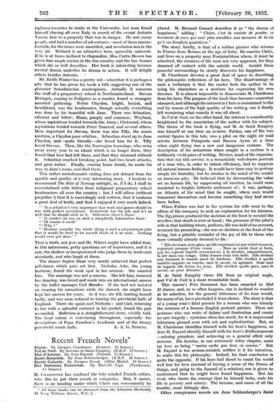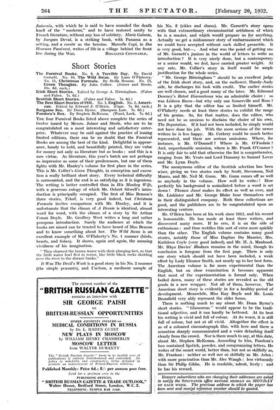Recent French Novels*
IS francs.)
M. CHARDONNE has confused -the tidy-minded -Frefieh critics, who like to put their novels in categories. But,. it seems, there is no heading under which Claire can conveniently be
All those books can be obtained from the Librairie Hachette, 18 King William Street, W.C. 2.
placed. M. Bernard Grasset describes it as " the drama of happiness," adding : " Claire, c'est la erainte de perdre, ce (aliment de crux qui sont plus sensibles our menaces de la vie qu'a ses bienfaits quolidiens."
The story, briefly, is that of a rubber planter who returns to France from Borneo at the age of forty. He marries Claire, and lives on a property near Yontainebleau where, it must be admitted, the menaces of life were not very apparent, for they shunned all contact with the outside world. Amidst these peaceful surroundings he slowly discovers his happiness.
M. Chardonne devotes a great deal of space to describing the philosophic reflections of his hero. The disadvantage of such a technique is that the reader feels the author to be using his characters as a medium for expressing his own theories. It is almost impossible to disassociate M. Chardonne from his hero. The purpose of the book thus becomes somewhat obscured, and although the interest in Claire is maintained to the end by reason of the high quality of the writing, one is finally left wondering what exactly it was all about.
In Vol de Nuit, on the other hand, the interest is considerably heightened by the association of the author with his subject. The theme of the book is flying, and M. de Saint Exupery was himself at one time an aviator. Fabian, one of 'the two central figures in this tale, was a pilot on the night air mail service between Patagonia and Buenos Ayres at a time when night flying was a new and dangerous venture. The description of his sensations when caught in a cyclone is a brilliantly vivid piece of writing. Rivitre, head of the organiza- tion that ran this service, is a remarkably well-drawn portrait of a man who, in. order to obtain efficiency, had to suppress all natural human feelings. It would have been easy to portray simply his brutality, but he awakes in the mind of the reader an immense pity. He believed that by discounting the value set on human life, by suppressing all emotion, he could raise mankind to heights hitherto undreamt of ; it was, perhaps, an Atlantis of the mind that he sought, where men would transcend themselves and become something they had never been before.
When Fabien was lost in the cyclone his wife went to the offices of the company to seek an explanation for his lateness. The Egyptians produced the skeleton at the feast to remind the revellers that death is ever at hand ; the presence of the pilot's wife in that building where, perforce, life was held of no account, reversed the proceeding : she was no skeleton at the feast of the living, but a pitiable reminder of the joy of life to those who were virtually already doomed to die :
" Elle devinait, avec gene, gwrfhe exprimait ici une vfritf ennemie, regrettait presque d'être venue . . . Mais sa verit8 etait si forte, quo les regards fugitifs remontaient, a la derobee, inlassablement, Is lire dans eon visage. Cette femme etait tree belle. Elle revelait /MX hommea le monde sacra du bonheur. Elle ravelait a quelle matiere august° on touehe, sans Is Favoir, en agissant. Sous tant de regards elle forma les yeux. Elle revalait quelle pair, sans is savoir, on pent detruire."
M. de Saint Exupery views life from an original angle, and Vol de Nuit is a most remarkable book.
This season's Prix Goncourt has been awarded to Mal D'Amour, and, as so often happens, one is inclined to wonder at its selection, for the general bitterness of its tone would, for many of us, have precluded it from choice. The story is that of a young man's fatal passion for a woman who was already the mistress of a famous English portrait painter. There are geniuses who can write of failure- and frustration and create an epic tragedy ; cynicism often has merit, for it is impersonal bitterness glossed over with wit and sophistication. But, as M. Chardonne identifies himself with his hero's happiness, so does M. Fayard identify himself with his hero's disillusionment —missing grandeur, and achieving as a general effect only rancour. His heroine, in one extremely witty chapter, stuns up love as being " mains cache que tout, en somme." But M. Fayard is too serious-minded, neither is it his intention, to make this his philosophy. Indeed, his final conclusion is quite the opposite. If his hero had dared to count the world well lost for love (instead of having a sense of the fitness of things, and going to the funeral of a -relation) one is given to understand that he might have found happiness. But his rival, who shows the cosirage tlsat he himself lacks, ends his life in poverty and misery. The heroine; and cause of all the trouble, most fittingly dies.
Other conspicuous -novels- are Jean- Sehlumbergerls- Saint Safurnin, with which he is said to have sounded the death knell of the " moderns," and to have restored sanity to French literature, without any loss of subtlety. Marie Galante, Lly Jacques Deval, is a striking book, with Panama as a Netting, and a cocotte as the heroine. Marcelle Capi, in Des Hammes Passerent, writes of life in a village behind the front







































 Previous page
Previous page